Trump administration charges 30 more people for Minnesota church protest

Listen to this article Listen to this article | 5 mins info The administration of United States President Donald Trump has broadened its prosecution of the protesters involved in a church demonstration to 39 people, up from nine. The demonstration was part of a backlash to Trump’s deadly immigration surge in the Midwestern state of Minnesota, but officials have sought to frame the protest as an attack on religious freedom. Recommended Stories list of 3 itemsend of list Attorney General Pam Bondi announced the expanded indictment on Friday in a message posted to social media. “Today, [the Justice Department] unsealed an indictment charging 30 more people who took part in the attack on Cities Church in Minnesota,” Bondi wrote. “At my direction, federal agents have already arrested 25 of them, with more to come throughout the day.” She added a warning to other protesters who might seek to disrupt a religious service. “YOU CANNOT ATTACK A HOUSE OF WORSHIP,” Bondi said. “If you do so, you cannot hide from us — we will find you, arrest you, and prosecute you. This Department of Justice STANDS for Christians and all Americans of faith.” Appealing to Christian voters Since taking office for a second term, Trump has sought to appeal to Christian conservatives by launching initiatives, for example, to root out anti-Christian bias and prevent alleged acts of Christian persecution, both domestically and in countries like Nigeria. But critics have accused his administration of attempting to stifle opposition through its prosecution of the Minnesota protest attendees. Some of those indicted deny even being a part of the January 18 protest. Defendants like former CNN anchor Don Lemon and reporter Georgia Fort say they attended in their capacity as journalists. Advertisement Both have pleaded not guilty to the charges and have publicly questioned whether their prosecution is an attempt to curtail freedom of the press. The superseding indictment, filed on Thursday, levies two counts against the 39 defendants, accusing them of conspiracy against the right of religious freedom and efforts to injure, intimidate or interfere with the exercise of religious freedom. “While inside the Church, defendants collectively oppressed, threatened and intimidated the Church’s congregants and pastors by physically occupying the main aisle and rows of chairs near the front of the church,” the indictment reads It also describes the protesters as “engaging in menacing and threatening behavior” by “chanting and yelling loudly” and obstructing exits. A magistrate judge on January 22 initially rejected the Justice Department’s attempt to charge nine attendees who were at the protest. But the department sought a grand jury indictment instead, which was filed on January 29 and made public the next day. A reaction to Trump’s immigration surge The protest, dubbed “Operation Pullup”, was conceived as a response to the violent immigration crackdown that had unfolded in Minnesota. Many of the enforcement efforts centred on the metropolitan area that includes the Twin Cities: St Paul and Minneapolis. Trump had repeatedly blamed the area’s large Somali American population for a welfare fraud scandal involving government funds for programmes like Medicaid and school lunches. In December, the Trump administration surged federal immigration agents to the region, nicknaming the effort Operation Metro Surge. At its height, as many as 3,000 agents were in the Minneapolis-St Paul area. But the effort was plagued by reports of excessive violence towards detainees and protesters alike. Videos circulated of officers breaking the car windows of legal observers, pepper-spraying protesters and beating people. Officers also engaged in the practice of entering homes forcibly without a judicial warrant, which advocates described as a violation of the Fourth Amendment of the Constitution. Cases of unlawful arrests were also reported. But a turning point came on January 7, when an agent with Immigration and Customs Enforcement (ICE) was caught on camera shooting into the vehicle of 37-year-old mother Renee Good. She died, and her killing triggered nationwide protests. Operation Pullup took place at Cities Church in St Paul less than two weeks later. It was intended as a demonstration against the church’s pastor, David Easterwood, who serves as a local official for ICE. Advertisement Several protesters have indicated that they are prepared to fight the government’s charges over the incident, citing their First Amendment rights to free speech. Some also said that they intended to remain vigilant towards government immigration operations, even after Trump administration officials announced Operation Metro Surge was winding down in mid-February. “This is not the time to be Minnesota Nice,” one protester, civil rights lawyer Nekima Levy Armstrong, wrote on social media last week. “It’s time for truth, justice, and freedom to prevail.” Adblock test (Why?)
Ramadan in Yemen’s Aden: Optimism dimmed by tensions and shortages
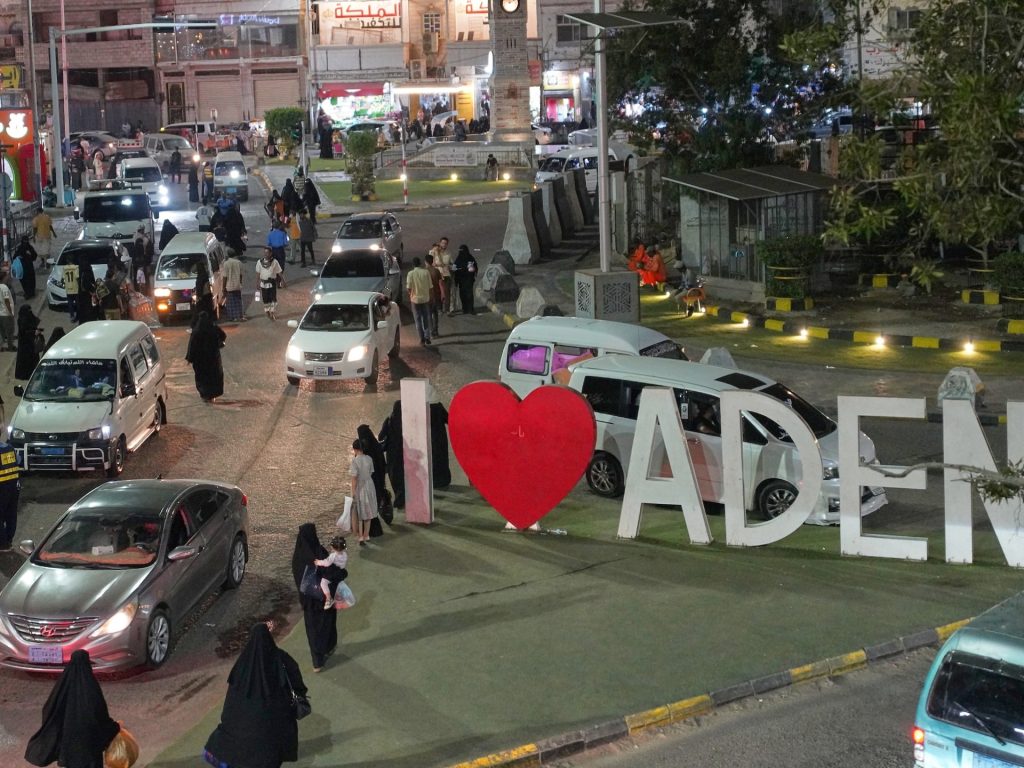
Aden, Yemen – Abu Amjad was shopping with his two children last week, finally able to take them out and buy them new clothes – a cherished Ramadan tradition in Yemen. The 35-year-old is a teacher, and he had just received his salary. That payment was a sign things are improving in Aden – the salaries are funded by Saudi Arabia as a way of backing the Yemeni government, which has recently arrived to take control of Aden after the defeat of secessionist forces. Recommended Stories list of 3 itemsend of list But problems and instability are never far away in Yemen. Just as soon as the children, Amjad, 10, and Mona, 7, began trying on their outfits, the sound of gunfire erupted. Shoppers froze. Amjad and Mona clutched their father, asking to leave. About 3km (2 miles) away, security forces had opened fire on protesters who attempted to breach the gates of al-Maashiq Palace, where members of the Yemeni government have been based since they arrived from Riyadh a week ago. The gunfire shattered the family’s moment of joy. “It ruins your joy when you see a person bleed and robs you of peace when you hear prolonged gunfire,” Abu Amjad told Al Jazeera. After years of operating from exile, Yemen’s Saudi-backed, UN-recognised cabinet is spending Ramadan in Aden, a move that has coincided with improvements in basic services and a renewed sense of relief. Yet that relief was overshadowed by the deadly confrontation between security forces and antigovernment protesters, in which at least one person was killed. “That was the first clash after the return of the government to Aden. Our concern is that it may not be the last,” said Abu Amjad. Government wins Yemen’s new Prime Minister Shaya al-Zindani has said that stabilising Aden and other areas under government control was among the new government’s main priorities. Advertisement The Yemeni government is currently in its strongest position for years. An advance by the separatist Southern Transitional Council (STC) at the end of last year in eastern Yemen ultimately was a step too far for the United Arab Emirates-backed group. Saudi Arabia considered the STC advance the crossing of a red line, and lent its full military backing to the Yemeni government, allowing it to take territory it had not controlled for years. Now, the Yemeni government and Saudi Arabia are focused on attempting to improve conditions in the southern and eastern areas of Yemen under government control, to attract more public support. That would in turn weaken support for both the STC and the Houthi rebels, who have controlled northwestern Yemen, including the capital, Sanaa, since the country’s war began in 2014. Lit city and busy markets Abdulrahman Mansour, a bus driver and resident of Khormaksar in Aden, said Ramadan this year feels different. “When I see the lights on and the markets busy on Ramadan nights in Aden, it feels like a different city. The improvement is undeniable,” Mansour, 42, told Al Jazeera. He noted that one distinct difference this Ramadan is the stable provision of electricity. “This reminds me of the pre-war time. We used to take that service for granted,” said Mansour. “When the city is dark at night, it appears gloomy, and families prefer to stay home. The movement of people brings life to the city and helps small businesses keep afloat, especially in Ramadan,” Mansour added. Yemeni Electricity Minister Adnan al-Kaf said last week that efforts to improve electricity services in Aden and other provinces continue, noting that Saudi support had contributed to improved service over the past two months. Wafiq Saleh, a Yemeni economic researcher, said the improvement in the living standards of citizens in Aden and southern Yemen, in general, was obvious, particularly after Saudi Arabia’s payment of public sector salaries and the supply of basic services such as water and electricity. Saleh told Al Jazeera, “The recent Saudi financial support has been very generous, and it can help the government during this period by enabling it to work on reactivating dormant resources, resuming oil exports, combating corruption, and improving the efficiency of revenue collection with transparency and good governance.” But Saleh emphasised that the progress achieved so far is not the result of economic reforms by the Yemeni government, but rather because of Saudi support. Advertisement Therefore, according to the economist, the improvement in the living situation and the currency’s value may not be sustainable, even if it is a positive indicator and may be the first step towards promised economic reforms in the country. “There must be a comprehensive vision for developing revenue collection so that the government can implement sustainable economic reforms,” Saleh said. Search for cooking gas While the distribution of electricity has improved in Aden, other essential services remain strained. Cooking gas shortages remain a major concern. The search for it remains a daily struggle for families in the port city, and the crisis has intensified in Ramadan. Lines of vehicles queue at stations, while residents wait with cylinders for a few litres (quarts) of gas. “Going from one station to another in search of cooking gas while fasting is exhausting,” said Fawaz Ahmed, a 42-year resident of Khormaksar district. Fawaz describes the shortage of cooking gas as a cause of hunger in the city. “If I stay in [my home] village, I would resort to firewood. But in the city, that option is not available, and if we find firewood in the market, it is expensive.” Gas distributors say the quantity of cooking gas supplied to them is not adequate, citing this as the root cause of the crisis. Supplies are transported from Marib province in northern Yemen. Tensions to continue The cooking gas shortage is a sign that it will not be plain sailing for the Yemeni government in Aden. And opponents will likely seize on any ongoing problems to foment more unrest. Majed al-Daari, editor-in-chief of the independent Yemeni news site Maraqiboun Press, described the situation in Aden as “very worrying”.
Is the US negotiating with Iran or preparing to strike?
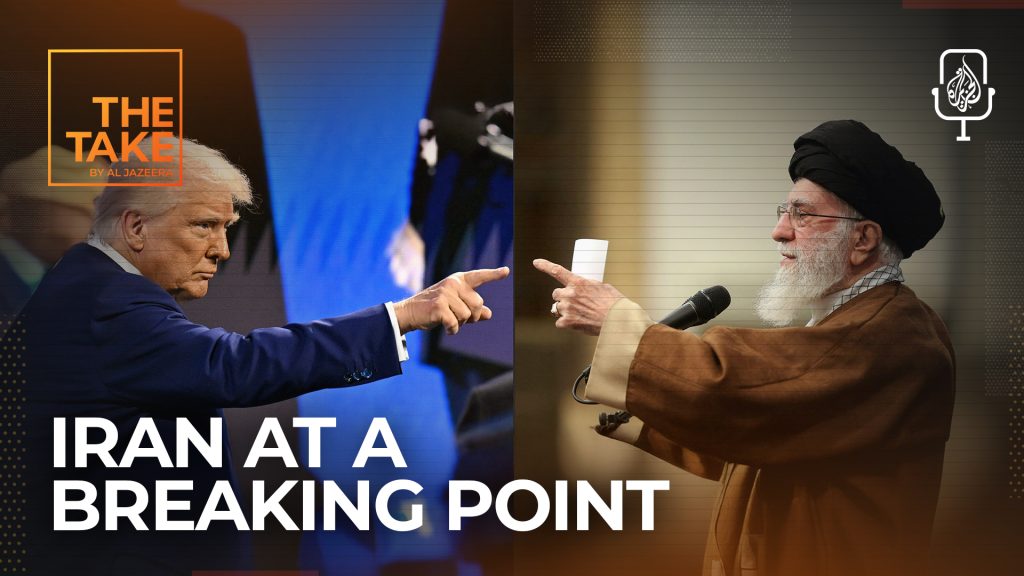
Iran and the US begin new nuclear talks as Washington builds up forces in the region. Iran and the United States are heading into a third round of indirect nuclear negotiations in Geneva, while US military assets build up across the region. Is either side prepared to compromise, or is the confrontation at a breaking point? In this episode: Episode credits: This episode was produced by Noor Wazwaz, Melanie Marich, and Marcos Bartolomé, with Spencer Cline, Tamara Khandaker, Tuleen Barakat, Maya Hamadeh, and our host, Malika Bilal. It was edited by Alexandra Locke and Sarí el-Khalili. Our sound designer is Alex Roldan. Our video editors are Hisham Abu Salah and Mohannad al-Melhem. Alexandra Locke is The Take’s executive producer. Ney Alvarez is Al Jazeera’s head of audio. Connect with us: @AJEPodcasts on X, Instagram, Facebook, and YouTube Published On 27 Feb 202627 Feb 2026 Click here to share on social media share2 Share plus2googleAdd Al Jazeera on Googleinfo Adblock test (Why?)
‘Like it’s 2024 again’: Trump takes centre stage in 2026 midterm elections
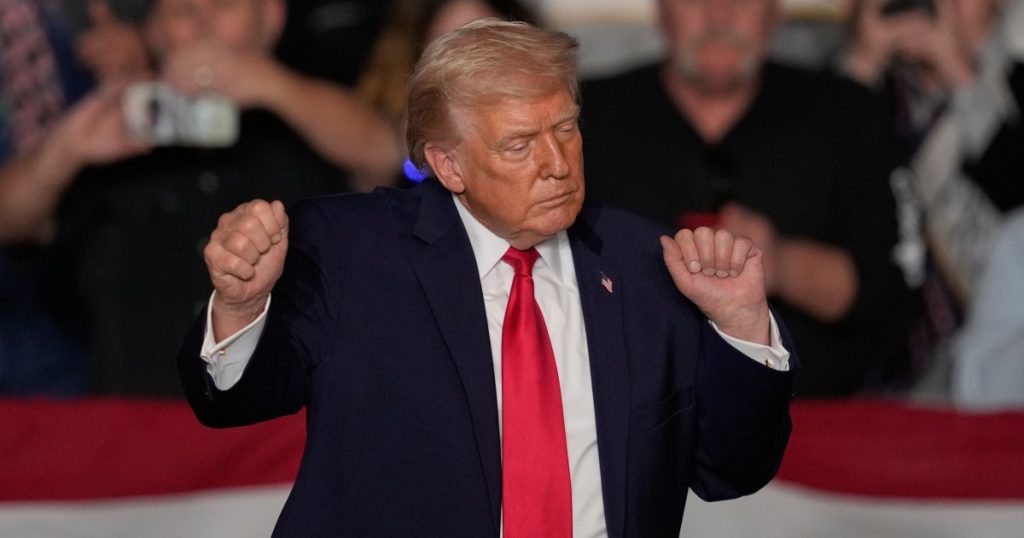
Nationalising the race The Republican Party has suffered losses since Trump’s return to the presidency last year. In 2025’s off-year races, Democrats notched a handful of victories, from Virginia to New Jersey. Wiles, a close adviser to Trump, has blamed the Republican defeats on Trump’s absence from the ballot. “Typically, in the midterms, it’s not about who’s sitting in the White House. You localise the election, and you keep federal officials out of it,” Wiles explained to The Mom View. “We’re actually going to turn that on its head and put him on the ballot, because so many of those low-propensity voters are Trump voters.” Her strategy is designed to harness the strong sense of loyalty Trump has engendered in the Republican Party. The YouGov poll found conservative voters overwhelmingly approved of his job, at a rate of 82 percent. A mid-January CBS News survey found an even higher approval rating — 90 percent — among US adults who identify as Republicans. “Since 2016, our surveys have all been off because we underestimate the Trump vote consistently,” said political scientist Lonna Rae Atkeson. “Trump has definitely drawn more support from irregular voters, people who don’t regularly go to the polls, during presidential elections.” But she questioned whether Trump’s endorsement would translate into increased support for down-ballot races. “We haven’t seen that carry over well to the midterms,” said Atkeson. “So it may not turn out well for him.” But putting Trump “on the ballot”, as Wiles suggests, also risks shifting the focus of the midterm races away from local issues. Instead, experts like Gillespie believe that “nationalising” the midterm races could homogenise both down-ballot candidates and their policy platforms, as they seek to reflect national priorities, not local ones. “One manifestation of polarisation in American politics is that national issues increasingly supplant local ones,” Gillespie said. “As national politics seep into state and local races, it becomes harder for federal candidates to distinguish themselves from Washington.” Adblock test (Why?)
Iran says US must drop ‘excessive demands’ in nuclear negotiations

Iranian foreign minister emphasizes seriousness and realism as key to successful negotiations with the United States. Listen to this article Listen to this article | 3 mins info Published On 27 Feb 202627 Feb 2026 Click here to share on social media share2 Share plus2googleAdd Al Jazeera on Googleinfo The United States must drop its “excessive demands” in nuclear talks with Iran to achieve a successful outcome, the Iranian foreign minister has said, as the US embassy in Jerusalem granted permission to nonemergency staff members to leave Israel amid fears of a regional war. Abbas Aragchi made the remarks during a phone call with his Egyptian counterpart Badr Abdel Ati, according to a report on Friday by the ISNA news agency. Recommended Stories list of 3 itemsend of list Iran’s top diplomat said that “success on this path requires seriousness and realism on the part of the other side and avoidance of any miscalculation and excessive demands”. He did not elaborate on what those demands are. Aragchi’s statement tempered down previous comments where he hailed “progress” at the talks and described the last round of negotiations between Iranian and US officials in Geneva as the “most intense so far”. “It concluded with the mutual understanding that we will continue to engage in a more detailed manner on matters that are essential to any deal – including sanctions termination and nuclear-related steps,” he said. Further negotiations will be conducted in parallel to meetings between technical teams in Vienna in the coming days, the Iranian diplomat added. American and Iranian officials left the Swiss city following the indirect talks mediated by Oman on Thursday to consult with their respective governments. Since resuming talks last month, the US has said it wants Iran to dismantle its nuclear infrastructure entirely, limit its arsenal of ballistic missiles and stop supporting regional allies. While Tehran has shown flexibility about discussing limitations on the enrichment of uranium for civilian use, it has so far treated missiles and proxies as non-negotiables. Advertisement US President Donald Trump has said he favours a diplomatic resolution to the standoff, but has repeatedly threatened to bomb Iran if it does not accept a deal. The US has amassed its biggest military arsenal in the region since the 2003 invasion of Iraq, including the world’s biggest aircraft carrier, the USS Gerald R Ford, which arrived on Friday in the Israeli port city of Haifa, according to Israeli Channel 12. Iran has said that it was not going to initiate a war, but that it was ready to respond if attacked, threatening to strike bases used by US forces in the region. The military build-up has left the region bracing for a potential war that could spiral into a regional conflict. On Friday, China told its citizens to evacuate from Iran “as soon as possible” and the US authorised the departure of nonemergency embassy staff from Israel – the same order Washington issued for the US mission in Lebanon earlier this week. Canada, India, UK and Poland have also issued similar orders. Adblock test (Why?)
LIVE: Pakistan declares ‘open war’ on Afghanistan, fighter jets bomb Kabul

blinking-dotLive updatesLive updates, Pakistani and Afghan officials have both declared full military operations as border clashes intensify. Published On 27 Feb 202627 Feb 2026 Click here to share on social media share2 Share plus2googleAdd Al Jazeera on Googleinfo Adblock test (Why?)
When money is scarce, every choice counts: Bank, cash, or credit?
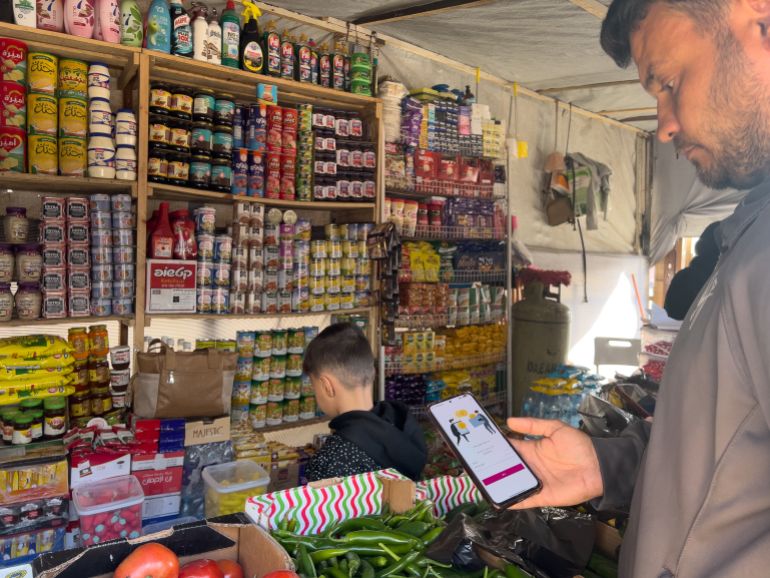
Gaza City – Amid the buzz of customers in the Remal neighbourhood in Gaza City, Samar Abu Harbied stops at a small, makeshift roadside stall to buy groceries to prepare an Iftar meal for her family, to break their fast during the Muslim holy month of Ramadan. With no cash in her purse, the 45-year-old housewife asks the grocer if she could put the bill on credit, until her husband or son could wire the money to him. “I have not touched a paper note for months. I don’t even have money to pay for a taxi. Now we walk a lot, for long distances,” Abu Harbied said. Najlaa Sukkar, 48, was trying to catch her breath at the same stall, which is run by her son Abdallah, after a failed journey on foot to see a doctor for a post-surgery check-up and to buy medication. Najlaa said she did not have enough money to pay the 30 shekel (US$9.5) check-up fees, and the only banknote she had, a 20-shekel bill, was so worn out that the pharmacist turned it down. “I returned without receiving medical care,” she told Al Jazeera. “At the pharmacy, they didn’t accept the banknotes as they were frayed. The taxi driver didn’t accept a banknote, only small change, which I don’t have. It is very difficult to get by. What a mess, we don’t know what to do!” Palestinians in the Gaza Strip are struggling to conduct their daily lives amid a severe cash flow problem imposed by Israel immediately after it embarked on its genocidal war on Gaza in October 2023. A US-brokered ceasefire that went into effect in October has brought little reprieve to Palestinians, who are still using worn-out currency they had from before the war, or must rely on a new system of electronic payments conducted through smart telephones amid limited internet coverage. Advertisement Palestinians in Gaza use the Israeli currency, the shekel, in their daily transactions, and depend on Israel to supply banks with new banknotes and coins. A customer pays for groceries using bank account transactions [Ola al-Asi/Al Jazeera] Electronic payments Palestinians were forced to turn to a digital payment system as a way to get around a severe shortage of Israeli shekel banknotes, a problem that has been exacerbated by the destruction of an estimated 90 percent of bank branches and cash machines. The Palestinian Monetary Authority, working with internet service providers, has pushed for mobile-based electronic payments, including PalPay and Jawwal Pay, to help Palestinians overcome the liquidity problem. Abu Harbeid said her son switched to electronic payments after he faced many problems using the 50 shekels per shift he was receiving while working as a night guard. “My son, Shady, was receiving his daily wage in cash, which was worn and torn. We could hardly break it into smaller change or buy anything, as sellers don’t accept overused paper bills,” she told Al Jazeera. “Moreover, the seller doesn’t accept it unless I spend it all, as they don’t have change. Now, as he is paid into his bank account, we buy everything through bank apps,” she added. But digital payments have added another layer of hardship to a large segment of the population. Most Palestinians still do not receive bank-transferred salaries, many lack access to smartphones, and those who have phones struggle to keep them charged in an area where electricity services are in severe crisis. To add to that, there is still the problem of finding a good internet connection for the transfer process. Abu Harbeid said a proper trip to the market requires her to have her husband or son with her to pay for goods. But neither can leave work to join her. “I prefer cash in my hand; I could buy anything on the go,” Abu Harbied said. Abdallah Sukkar, owner of a street grocery stall, recording the details of a customer buying goods on credit [Ola al-Asi/Al Jazeera] Not only a liquidity shortage issue Analysts say Gaza’s current economic reality started as a liquidity crisis, but has become an issue of transition from a regulated financial system to a fragmented survival economy shaped by scarcity, informality, and political constraints. “However, as the months passed, the crisis evolved into something far more structural,” Ahmed Abu Qamar, member of the board of directors of the Palestinian Economists Association, told Al Jazeera. Advertisement “The black market now plays a dominant role in determining liquidity conditions. A small group of traders effectively manages cash circulation through high-commission cashing operations.” He said that when money itself becomes a traded commodity, it signals severe distortion in the monetary system. “Cash, like any commodity, becomes subject to supply and demand dynamics. When it becomes scarce, its value increases beyond its nominal worth. From an economic perspective, this represents a structural disruption of the monetary system. “The formal banking sector and the Palestinian Monetary Authority were sidelined. What we are seeing is the neutralisation of the formal monetary system,” he said. Abu Qamar said the deeper issue was confidence – not just in cash, but in the financial system as a whole. “Cash is inherently difficult to track, whereas electronic payments are traceable and can be frozen or restricted. Implementing such a transition abruptly produces severe economic and social distortions,” he warned. “Widespread selling on credit is not a sign of market stability – it is an indicator of declining incomes and weakened purchasing power. When debt expands rapidly without a parallel increase in income, the result is social fragmentation. Approximately 95 percent of households in Gaza depend on aid,” he added. People shopping for goods at a grocery store in az-Zawya market [Ola al-Asi/Al Jazeera] Profiteering from Gaza’s woes The war has paved the way for middlemen to cash in illegally on the financial woes of Gaza, residents said. Sukkar said that when her husband or sons needed cash, they were often forced to deal with brokers who charge a hefty commission that could reach 50 percent.
Russia-Ukraine war: List of key events, day 1,464

These are the key developments from day 1,464 of Russia’s war on Ukraine. Listen to this article Listen to this article | 5 mins info Published On 27 Feb 202627 Feb 2026 Click here to share on social media share2 Share plus2googleAdd Al Jazeera on Googleinfo Here is where things stand on Friday, February 27: Fighting Russian forces launched 720 attacks on 31 settlements in Ukraine’s front line Zaporizhia region, killing one person and injuring eight others, regional governor Ivan Fedorov wrote on the Telegram platform. The attacks included drone strikes, artillery shelling and three missile strikes, Fedorov said. Ten people, including an eight-year-old child, were also injured in an overnight Russian attack on the regional capital, Zaporizhzhia city, the region’s military administration said. Russian strikes damaged about 80 high-rise buildings and private houses in three districts of the city, as well as two shopping centres, the administration added. Russian forces injured 16 people, including two children, in attacks on the Ukrainian city of Kharkiv, Governor Oleh Syniehubov said in a post on Facebook. A Russian first-person-view (FPV) drone reached Ukraine’s Kharkiv region on Tuesday, marking the first time Ukraine had detected this type of drone reaching the region, the Kharkiv Regional Prosecutor’s Office said in a statement. The drone hit a tree and no injuries were reported, the office added. Ukrainian missiles struck the Russian border town of Belgorod, inflicting serious damage on energy installations and disrupting power, water and heating, the region’s governor, Vyacheslav Gladkov, said early on Friday. Belgorod Mayor Valentin Demidov said on Telegram on Thursday that “nearly 10,000 customers in the city are temporarily without power” following “regular shelling of Belgorod’s power facilities by the Ukrainian Armed Forces”. Belgorod’s operational headquarters also said on Thursday that at least 115 Ukrainian drones had been launched towards the region in a 24-hour period. More than 90,000 Ukrainians are considered to be “missing under special circumstances”, the Ukrainska Pravda media outlet reported, citing Ukraine’s commissioner for missing people, Artur Dobroserdov. Those missing include members of the military as well as civilians, including children, Ukrainska Pravda reported. Ukraine’s Coordination Headquarters for the Treatment of Prisoners of War said that Ukraine had received the remains of 1,000 bodies from Russia, “which, according to preliminary information from the Russian side, may belong to Ukrainian defenders”. Russian presidential aide Vladimir Medinsky confirmed in a post on Telegram that Russia had handed over the bodies of 1,000 “fallen Ukrainian soldiers” to Kyiv and received 35 bodies of Russian soldiers. The exchange followed recent trilateral talks between Russia, the United States and Ukraine in Geneva, Switzerland. Advertisement Peace negotiations Ukrainian and US officials again met in Geneva on Thursday to discuss post-war reconstruction, even as a deal to end the war remains elusive, the Reuters news agency reported. Putin’s special economic envoy Kirill Dmitriev said Russian officials also held talks with US officials on Thursday, the RIA Novosti news agency reported. Politics and diplomacy Russia said on Thursday it would retaliate against a European Union decision to cut Moscow’s diplomatic representation in Brussels, and that the move showed the EU did not deserve to take part in negotiations on ending the war in Ukraine. Russian Ministry of Foreign Affairs spokeswoman Maria Zakharova said the EU decision to limit the size of the Russian mission to 40 people was “discriminatory” and would not go unanswered. Zakharova also said that any deployment of British troops in Ukraine would prolong the war and bring an “increase in the risk of a large-scale military confrontation involving many more states”, following a recent newspaper article by British Defence Minister John Healey. French Ministry of Defence spokesperson Olivia Penichou told reporters that Russia’s accusation that Ukraine was developing a “dirty” nuclear bomb was “baseless”, accusing Russia of using “disinformation to foster a climate of mistrust”. Hungarian Prime Minister Viktor Orban asked the EU to send a “fact-finding mission” to assess damage to the Druzhba oil pipeline in Ukraine, in a letter seen by Reuters. The request follows after Ukrainian President Volodymyr Zelenskyy claimed that repairs to the pipeline that supplies Hungary and Slovakia with oil were taking an extended period of time due to ongoing Russian attacks. Regional security Swedish broadcaster SVT reported that a suspected Russian drone approached France’s Charles de Gaulle aircraft carrier while it was docked in Sweden’s Malmo. Swedish Minister of Defence Pal Jonson confirmed there had been a violation of Swedish airspace at the same time a Russian military ship was in Swedish waters. Romania scrambled fighter jets on Thursday when a drone breached its national airspace during a Russian attack on Ukrainian infrastructure near the border, Romania’s Ministry of National Defence said, the second airspace breach in as many days. Sanctions The US has extended the deadline to April 1 for companies to negotiate with US-sanctioned Russian oil company Lukoil over its international assets, according to a document from the Office of Foreign Assets Control seen by Reuters. Advertisement Adblock test (Why?)
Epstein and the politics of distraction
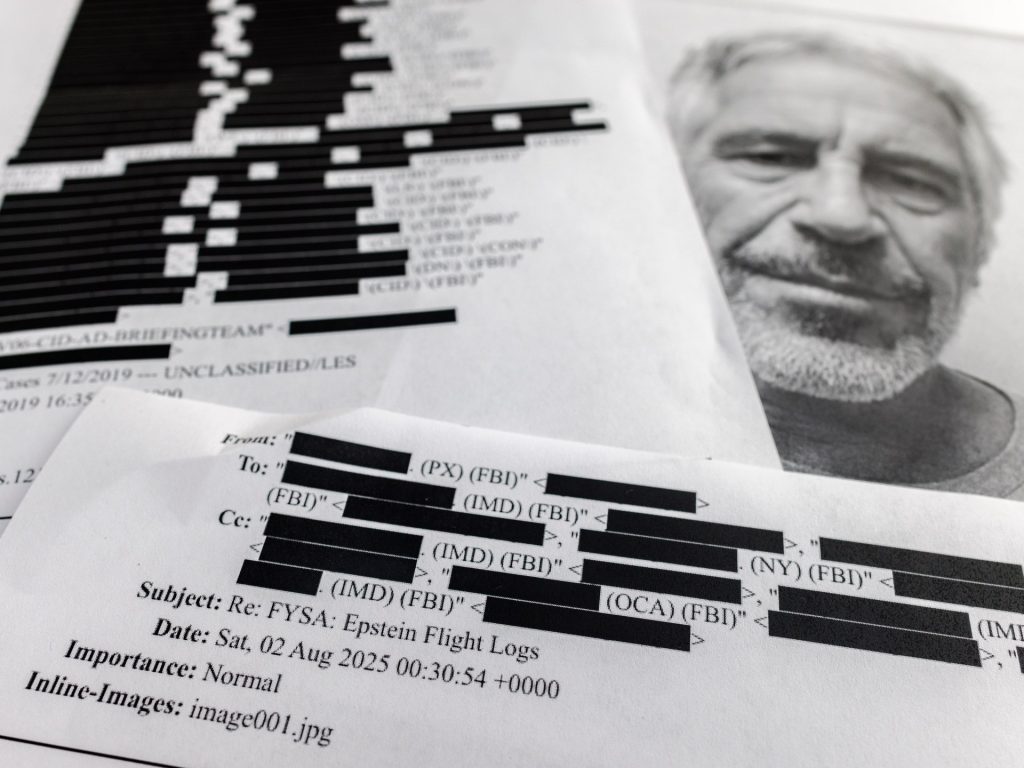
After the beginning of Trump’s second term, the connections between capitalism, white supremacy and imperial domination became increasingly clear. These have been highlighted through ICE raids as modern-day slave patrols, global criminal operations such as the kidnapping of Venezuelan President Nicolas Maduro and his wife Cilia Flores, and United States assistance to Israel’s genocide in Gaza as a bipartisan US and transnational corporate experiment. The growing understanding that people in the Global South, along with Black, Indigenous and other People of Colour (BIPOC) within the imperial core, face a common enemy has galvanised an anti-colonial, revolutionary movement committed to radical transformation. And then the release of the Epstein files flooded public discourse. Jeffrey Epstein was a financier convicted of sex crimes involving minors. After renewed federal charges in 2019, he died in jail (officially ruled a suicide). The case triggered public outrage about ruling class impunity, media focus on unsavoury associations between the political and corporate class and a plethora of conspiratorial narratives about cover-ups. The Epstein case became far more than a criminal proceeding; it reflects a symbolic exposure of ruling class impunity and concentrated power and a spectacle of corruption within an empire in deep crisis and decline. The Epstein case exposed ruling class criminality while simultaneously displacing structural accountability. Importantly, “spectacle” does not mean “fake”; it means the organisation of politics through symbolic drama that displaces structural political analysis. With spectacle, social contradictions (inequality, social crises and instability) are dramatised rather than structurally challenged. Advertisement The enduring media and public fixation on the Epstein files, particularly as their release proceeds with little accountability and continued narratives that discredit and isolate survivors, serves less as accountability and more as a political diversion from systemic injustices: Racism, capitalism, the growth of the police state and ongoing international impunity. More troubling still, it marks another step in the erosion of democracy and the consolidation of expansionist, war-driven fascism. Fascist spectacle In work by Walter Benjamin, Hannah Arendt, Guy Debord, Umberto Eco and others, fascist spectacle involves anti-intellectual and emotionally driven mass mobilisation around simple moral binaries (pure people v the corrupt ruling class), where action is revered while thought is reviled; the replacement of institutional process with symbolic imagery and drama; and mythic narratives of national decay and rebirth. Political theorist Roger Griffin calls this rebirth “palingenic ultranationalism”, that is, destruction as a precondition for rebirth. The function of spectacle is to subvert principled analysis and resistance to oppression with emotion – outrage, disgust, despair and helplessness. Conspiracy theories are the narrative engine of spectacle. They transform systemic crisis and social instability into simple, emotionally gripping stories of social taboo-breaking, centred on hidden and untouchable enemies, laying the groundwork through which authoritarian solutions are marketed as necessary and even redemptive. When structural violence becomes visible, but accountability remains absent, public anger often seeks explanation through personalised and conspiratorial narratives rather than systemic analysis. Amid growing distrust and corruption in mainstream media and the rise of citizen-driven and alternative social media ecosystems, conspiracy theories surrounding the Epstein case have blossomed: Claims of secret global cabals engaged in immoral sexual criminality, ritualistic fantasies involving human sacrifice, cannibalism and ancient symbolic structures and explicitly racist and anti-Semitic tropes about hidden rulers, among others. Theories like these, whether wholly true, partially true or false, are not new; fascist movements have historically mobilised around the idea that the nation is being secretly corrupted by a degenerate ruling class, with a radical cleansing necessary to return to a righteous path. These narratives do not expose a corrupt system; they obscure and mystify it. By sensationalising corruption into myth and providing explicit, though untouchable, targets for public outrage, they displace rigorous anti-colonial and material analyses of structural exploitation, greed and state violence with collective authoritarian longing for a strongman and the suppression of dissent to restore order. Advertisement The criminality of Epstein and the powerful figures who orbited him and participated in his abuses have come to symbolise a degenerate ruling class with identifiable names and faces, targets who could be exposed and jailed, thereby clearing the narrative space for a heroic white knight to ride in with promises of salvation. As Hannah Arendt warned, conspiracy thinking thrives when trust in institutions collapses. The Epstein scandal intensified the sense of a ruling class operating above the law and of a justice system which protects its own, conditions ideal for authoritarian movements to exploit by insisting the system is irredeemably rigged and that only a strong leader can tear it down. As such, the spectacle of the Epstein scandal can absorb and manipulate public outrage, redirecting it away from necessary structural accountability in the form of decolonisation and redistribution of wealth, ultimately reinforcing the very systems it appears to challenge. In doing so, it promotes the aesthetics of politics – the spectacle – rather than grounded critiques of capitalism and imperial power. Further, it serves to distract from failures ultimately promoting oppression and war. According to Federico Caprotti, various forms of fascist spectacle produce a “collage” which both expresses and obscures the syncretic ideology of the regime. The grand spectacle: War When politics becomes theatre rather than collective progress dependent on accountability, transformation or reform, crisis becomes emotional drama, drama demands release (internal resolution) or escalation and escalation inevitably finds its expression in externalised war, in which the nation performs a grand spectacle of unity and sacrifice on the largest possible stage. War acts as a stabilising force when internal contradictions cannot be resolved through collective mobilisation. With its uniforms and marches, war channels discontent by uniting a fragmented, outraged population against an externalised enemy, transforming righteous anger at the violence, oppression and greed of a ruling class into manufactured unity, heroism and meaning through violence against “the other”. These dynamics, outlined by Benjamin decades ago, feel alarmingly familiar in the present moment, including in the spectacle surrounding the Epstein scandal. In this context, external conflict functions not only as policy but as emotional consolidation, redirecting internal
From Gaza to defence: Five key takeaways from Indian PM Modi’s Israel visit
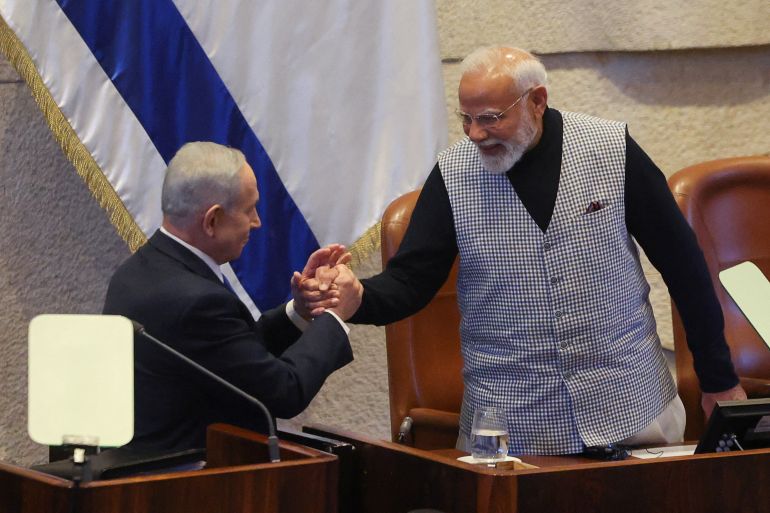
Indian Prime Minister Narendra Modi has wrapped up a two-day visit to Israel, which was marked by a welcoming embrace from his counterpart, Benjamin Netanyahu, and a conspicuous silence about Israel’s genocidal war in occupied Palestinian territory. During the visit, which began on Wednesday, the two leaders lauded their strong friendship, which they said has deepened bilateral ties, and signed agreements on a range of issues, including innovation and agriculture. “You are a great friend of Israel, … Narendra. You are more than a friend. You are a brother,” Netanyahu told Modi when both leaders addressed the Israeli parliament in Jerusalem on Wednesday. Netanyahu showed Modi around Yad Vashem, a memorial in Jerusalem to the victims of the Holocaust, and hosted a dinner after they had spoken to the Knesset, where Modi was conferred with the parliament’s highest honour. This was the second ever visit by an Indian prime minister to Israel after Modi’s first visit in 2017. That time, he also did not visit Palestine despite India’s long history of supporting the Palestinian cause. While India opposed the creation of Israel in 1948 and formalised diplomatic relations only in 1992, relations between the two countries have improved since then, flourishing particularly since Modi became India’s prime minister in 2014. Since then, their ties have blossomed, anchored in defence and the shared nationalistic leanings of their leaders. Here are five key takeaways from Modi’s trip to Israel: Netanyahu greets Modi during a special session of the Knesset on February 25, 2026 [Ronen Zvulun/Reuters] Full support for Israel, silence on Gaza genocide Wednesday was the first time an Indian leader had addressed the Knesset. Modi received a standing ovation after declaring: “India stands with Israel firmly, with full conviction, in this moment and beyond.” Advertisement Modi told the Israeli parliament that he carries “the deepest condolences of the people of India for every life lost and for every family whose world was shattered in the barbaric terrorist attack by Hamas on October 7” in 2023. “We feel your pain. We share your grief. India stands with Israel firmly, with full conviction, in this moment and beyond,” he said. “No cause can justify the murder of civilians. Nothing can justify terrorism.” The Indian prime minister referred to the Mumbai attacks in 2008, which New Delhi has blamed on neighbouring Pakistan, saying: “Like you, we have a consistent and uncompromising policy of zero tolerance for terrorism with no double standards.” Modi also threw his weight behind United States President Donald Trump’s 20-point Gaza peace plan, stating that India “supports all efforts that contribute to durable peace and regional stability”. While Modi said he backed “dialogue, peace and stability in the region”, he skipped any mention of the continuing genocide in Gaza, where the Israeli army has killed more than 72,000 Palestinians since October 2023. Anwar Alam, a senior fellow at the Policy Perspective Foundation, a think tank in New Delhi, said the timing of Modi’s visit is “too poor and has grossly compromised India’s historical pro-Palestine stand”. Alam argued that while New Delhi, a leader of the anticolonial nonalignment movement, can continue to maintain ties with Tel Aviv, “India cannot allow itself to display such insensitivity to Palestinian sufferings and stand with the coloniser.” Modi signs the guestbook at Yad Vashem as Netanyahu and Dani Dayan, chairman of the Yad Vashem Holocaust Memorial Museum, watch on February 26, 2026 [Ilia Yefimovich/AFP] Modi emphasises ‘civilisational ties’ with Israel One reason Modi, unlike previous Indian leaders, has displayed such warmth towards the Israeli prime minister is the Indian Hindu right’s enthusiasm for the ideology of Zionism, analysts said. Modi’s Bharatiya Janata Party (BJP) has roots in a philosophy, Hindutva, which ultimately seeks to transform India into a Hindu nation and a natural homeland for Hindus anywhere in the world – similar to Israel’s view of itself as a Jewish homeland. During his speech to the Knesset, therefore, Modi doubled down on what he called the “civilisational ties” between the two nations. He started his address to the Knesset by announcing himself as “a representative of one ancient civilisation addressing another”. “We are both ancient civilisations, and it is perhaps no surprise that our civilisational traditions also reveal philosophical parallels,” he said, quoting the Israeli “principle of ‘tikkun olam’ about healing the world”. Advertisement “In India, there is great admiration for Israel’s resolve, courage and achievements,” Modi said. “Long before we related to each other as modern states, we were linked by ties that go back more than 2,000 years.” Modi mused about “returning to a land to which I have always felt drawn”. “After all, I was born on the same day that India formally recognised Israel – September 17, 1950.” While India formally recognised Israel in 1950, two years after its formation, it only established diplomatic relations with it in 1992. Modi disembarks as he arrives at Ben Gurion International Airport near Tel Aviv, Israel, on February 25, 2026 [Shir Torem/Reuters] Deepening defence ties These days, India is Israel’s largest weapons buyer, pumping billions of dollars into Israel’s defence industry each year. In 2024 as Israel waged its war on Gaza, Indian weapons firms sold Israel rockets and explosives, according to an Al Jazeera investigation. On Thursday, Modi held talks with Netanyahu focused on further boosting ties in the areas of defence and security along with trade, technology and agriculture. “We have decided to establish the Critical and Emerging Technologies Partnership. This will give new momentum to cooperation in areas such as AI, quantum, and critical minerals,” Modi said. The two countries are also currently negotiating a free trade agreement. Elevating strategic ties India and Israel are reportedly inching closer to an alliance, along with other global powers, to boost security cooperation. Before Modi’s visit, Netanyahu pitched a “hexagon of alliances” that he said would include India, Greece, Cyprus and other unnamed Arab, African and Asian states to collectively stand against what he called “radical” Shia and Sunni Muslim “axes” of adversaries in

